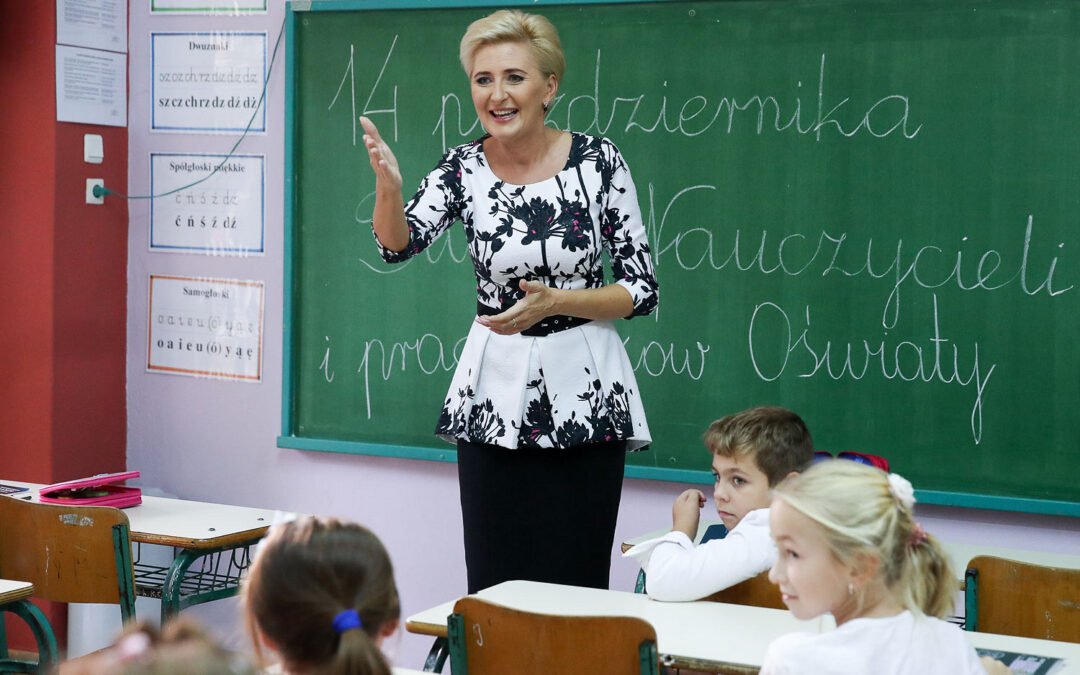In an unusual move, Poland’s first lady, who usually avoids public involvement in policy issues, has invited opposition politicians to meet with her next week to discuss a contentious education bill that would centralise control over schools.
Before her husband became president in 2015, Agata Kornhauser-Duda was herself a school German teacher. Yesterday, MPs from Poland’s largest opposition group, the Civic Coalition (KO), appealed to her to present her views on the legislation.
The bill, which was approved by the lower house of parliament last week, grants government-appointed education superintendents additional powers over hiring and dismissing headteachers, as well as over preventing outside organisations from operating in schools.
The education minister says that the new system is necessary to “protect children from moral corruption”. But NGOs and teachers’ unions worry that it will further extend the ruling national-conservative Law and Justice (PiS) party’s ideological influence over schools.
At a press conference on Wednesday, the four KO MPs – Kinga Gajewska, Katarzyna Lubnauer, Barbara Nowacka and Krystyna Szumilas – criticised the proposed reform and appealed to the first lady to “express her opinion” given her “long tenure” as a school teacher.
“Entrusting a centrally appointed superintendent with practically full control over the activities and life of the school will deprive pupils of the opportunity to develop,” they wrote in a separate letter to Kornhauser-Duda. They noted that superintendents are either “directly or at least ideologically” linked to the ruling party.
“We hope that, due to your many years of experience working in school, you also have doubts as to the adopted amendment and that your voice will be taken into account when President Andrzej Duda makes his decision,” the opposition MPs addressed the president’s wife in their letter.
Właśnie zadzwonili do nas z @prezydentpl z zaproszeniem na spotkanie. #LexCzarnek w grze pic.twitter.com/nXDWkOPkEt
— Kinga Gajewska (@gajewska_kinga) January 19, 2022
Andrzej Duda – who is a PiS ally – is likely to have to make a decision on whether to sign the bill into law. After being passed last week by the lower-house Sejm, the legislation has moved on for consideration by the upper-house Senate.
The Senate is controlled by the opposition, and is likely to reject the bill. But that decision can be overturned by the more powerful Sejm, where PiS has a governing majority. Once that happens, it will pass to the president, who can sign or veto it.
Within minutes of the opposition MPs issuing their appeal, they were contacted by the presidential chancellery in order to set up a meeting with Kornhauser-Duda, reported Wirtualna Polska. Gajewska then confirmed that they had received the call and a meeting would take place, reportedly on 24 January.
Meanwhile, the president himself is due to meet this week with the education minister, Przemysław Czarnek, amid media reports that Duda’s office has some qualms with the bill. The president has on a handful of previous occasions shown himself willing to wield his veto.
Main image credit: Grzegorz Jakubowski/KPRP

Maria Wilczek is deputy editor of Notes from Poland. She is a regular writer for The Times, The Economist and Al Jazeera English, and has also featured in Foreign Policy, Politico Europe, The Spectator and Gazeta Wyborcza.




















